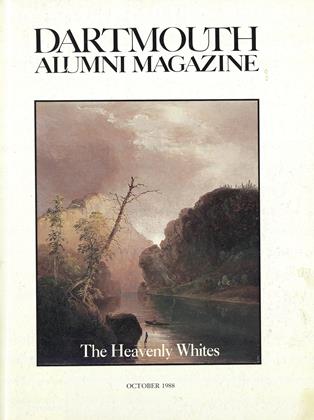VOX
"Do something about our symbol" was the last charge from the boys when I boarded the plane to Hanover three years ago as a newly elected member of the Alumni Council, the first from San Diego in years.
Dutifully, I began to explore the other side of the issue to see where the real hangups were, talking with students, administration types and native Americans too. I went to the library to look up Eleazar's charter for the College and right away found a surprising twist from the legend.
According to research by History Professor Jere R. Daniell II '55, the long-held notion that Eleazar founded an Indian school is less than completely true. Wheelock's evangelical dream to educate the natives was quickly thwarted by the need for ministers in the new settlements.
John Kemeny was dismayed to find that only 15 Indians had ever been granted diplomas during Dartmouth's first two centuries. Even the notion that Indians have enjoyed free tuition at the College has never been true (they must qualify for financial aid like everyone else on campus).
However, Dartmouth has done no worse than the rest of the country. None of the truly American civilizations ever had a fair slice of the "American" dream. The nation's first inhabitants were forced onto the worst of the land, tricked, robbed and butchered. So our intended honor projects a cruel caricature of what the native Americans almost were.
President Kemeny launched a program, now called Native Americans at Dartmouth, that has grown to national significance and today supports nearly 100 Indian students. In a May 1987 letter to the Alumni Council, program director Bruce Duthu '80 reported that Dartmouth's native Americans "have gone on to successful careers as tribal attorneys, physicians, teachers, writers, business people, politicians and administrators." In other words, they don't tend to get lost in Wall Street but find their way back to help their people.
program a real boost. However, recruiting native students is tough. It's rare that many graduate from high school let alone make straight "A's." Without family college backgrounds the native kids tend to think in terms of jobs and pickup trucks. They need to see positive examples among their own kind. The challenge is to find practical ways for alumni to facilitate contact between these role models and Indian kids.
In my own San Diego County, through programs sponsored by the Bureau of Indian Affairs, volunteers can help with career counseling and support. And alumni in my area are beginning to do just that.
The San Diego Dartmouth Club is all for Dartmouth's native recruiting program, and my hope is that other clubs will take up the activity. Counseling kids is great fun and most satisfying. All that is needed is an alumnus in each area to spearhead it.
I'll sing to Eleazar again — and soon, I hope, because the tradition is rich and cherished. But it will be with my pals who share the tradition, and not where we could offend. For now I understand the offense. Times have changed . . . and we must too. Besides, we have work to do to help the Indians —and Dartmouth.
George Harris, a mortgage banker, was on the Alumni Council from 1985 until this year.
 View Full Issue
View Full Issue
More From This Issue
-
 Cover Story
Cover StoryPutting Heaven in Perspective
October 1988 By Karen Endicott -
 Feature
FeatureThe Zen of Football
October 1988 By Nick Lowery '78 -
 Feature
FeatureScions Of The Times
October 1988 By Fritz Hier '44 -
 Feature
FeatureChecking into the Inn and Out of an Era
October 1988 By John Townsley -
 Article
ArticleFunded Research Rises
October 1988 -
 Sports
SportsWomen for All Seasons
October 1988
Features
-
 Features
FeaturesReconstruction Radical
MARCH | APRIL 2021 By ALLAN A. RYAN ’66 -
 Feature
FeatureDoctor Blum Measures the World
NOVEMBER 1997 By Cynthia Berger '79 -
 Feature
FeatureGove (gōv), Philip (fĩl'ìp) B.
MAY 1959 By JAMES B. FISHER '54 -
 Feature
FeatureThe Best of The Old Farmer's Almanac
June 1992 By Judson Hale '55 -
 Features
FeaturesHow We Chose
SEPTEMBER | OCTOBER 2022 By LISA FURLONG -
 Feature
FeatureVerdict on the Dartmouth Institute: A-OK
OCTOBER 1972 By ROBERT B. GRAHAM '40

